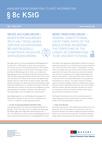
Decision of the Federal Constitutional Court on Section 8c KStG
According to the regulations regarding the forfeiture of losses of corporations (Section 8c (1) of the German Corporate Income Tax Act), if more than 25 % of the capital or voting rights in a corporation are transferred to one acquirer within five years (harmful acquisition), the losses of the corporation which were present until the harmful acquisition can no longer be deducted to the amount of the capital or voting rights which were transferred. If more than 50 % of the subscribed capital or voting rights are transferred to one acquirer, any losses which have not been used are forfeited completely. However, if hidden reserves exist, the losses will be retained equivalent to the sum total of hidden reserves. Another regulation stipulates that there are certain circumstances in which the transfer of shares within a group does not lead to the forfeiture of losses.
The Federal Constitutional Court has now declared parts of these regulations to be unconstitutional in a decision made on 29 March 2017 and published on 12 May 2017.
1. Scope of the decision
According to the decision of the Federal Constitutional Court, only Section 8c (1)(1) of the standard is unconstitutional. The Court found that sentence one violates the general principle of equality (Article 3 (1) of the German Constitution). The decision therefore relates solely to the proportionate forfeiture of the accumulated losses of a corporation in the event that more than 25 % and up to 50 % of the shares are transferred within five years. For the time being, the finding of unconstitutionality only applies to the period between 1 January 2008 and 31 December 2015.
The Federal Constitutional Court expressly left open the question of whether the complete forfeiture of losses in the event of a harmful acquisition of more than 50 % of the shares within five years (Section 8c (1)(2) of the German Corporate Income Tax Act) is also unconstitutional.
2. Reasons for unconstitutionality
In the view of the Federal Constitutional Court, the general principle of equality in Article 3 (1) of the German Constitution requires tax legislation to comply with the principle of taxation based on economic capacity. The Court found that this principle was particularly violated by Section 8c (1)(1) of the German Corporate Income Tax Act, as it makes the determination of the taxable income of a corporation, and in particular the usage of losses, dependent on whether or not a harmful acquisition has taken place.
The Court does not believe that there are any objective grounds which justify this unequal treatment. It stated that legislation could be drafted while making generalising, categorising and universal regulations without violating the general principle of equality. However, legislation should use typical rather than atypical cases for guidance in order to reflect reality.
The Court stated that combating legal but undesirable taxation situations, in particular the trading of losses which can be carried forward (“shell company purchases”), is a legitimate goal which would justify unequal treatment in the sense of Article 3 (1) of the Constitution. However, it also stated that the limits of permissible categorisation would be exceeded if solely the transfer of a shareholding in excess of 25 % was used to categorise such situations, as this situation per se is not an indication of abuse, due to there being a number of possible reasons for transferring such a shareholding to a loss allocation company. This would not regularly be done in order to render the losses usable for a different company held by the new shareholder.
The Court also stated that the legal requirement for the taxable entity causing the loss to be economically identical to the taxable entity using the loss in order to justify unequal treatment is inadequate, as far as the definition of a change in economic identity is that more than 25 % and up to 50 % of the shares in a corporation are transferred to an acquirer directly or indirectly within five years.
3. Action required by the legislature by 31 December 2018
The Court did not declare the regulation in Section 8c (1)(1) of the German Corporation Tax Act void, but merely stated that it was unconstitutional. It also provided the legislature with an opportunity to rectify the unconstitutional situation retroactively to the point at which the standard was first introduced (1 January 2008). If the legislature fails to comply with this obligation by 31 December 2018, the standard will automatically be rendered void retroactively from 1 January 2008.
4. Options of the legislature
It is currently unclear how the legislature will react to the decision of the Court. In principle, it has two options.
If the legislature makes use of the opportunity to reform the legislation, it will have to restrict the forfeiture of losses to cases involving genuine abuse. From the perspective of the Court, the simple acquisition of a stake of between 25 % and 50 % does not justify even a partial forfeiture of losses. Prerequisites for what constitutes abuse must therefore be added to the standard. It is not clear what these prerequisites will look like. The revision will then apply to all cases which have not received a final decision. The forfeiture of losses would then have to be re-evaluated in these cases. It is expected that a number of cases which would result in a partial forfeiture of losses under the current regulations would no longer involve a forfeiture of losses with retroactive effect. If the legislature chooses this option, it will likely take the recently introduced regulation in Section 8d of the German Corporate Income Tax Act into consideration as well. This regulation states that losses will not be forfeited if the corporation has been exclusively involved in the same business operations for a certain period and will maintain these operations in future. Possibly the application of this regulation will be expanded to old cases before 1 January 2016.
It is extremely unlikely that the legislature will choose the second option of simply abandoning the regulation in Section 8c (1)(1) of the German Corporate Income Tax Act.
5. Outlook
It is very likely that the legislature will make use of the option to revise the regulation in Section 8c (1)(1) of the German Corporate Income Tax Act as permitted by the Constitutional Court. The alternative would be a loss of tax revenue, which would not be welcomed by the tax authorities. However, the amendment will not be addressed until the new government is in place after Germany’s parliamentary elections.
It remains unclear how the legislature will react. In light of the fact that a final decision regarding the constitutionality of some parts of the loss forfeiture standard has not been made, particularly as regards the constitutionality assessment after 31 December 2015 and the complete forfeiture of losses in the event of a harmful acquisition of more than 50 %, cases affected by this legislation should be kept open.



